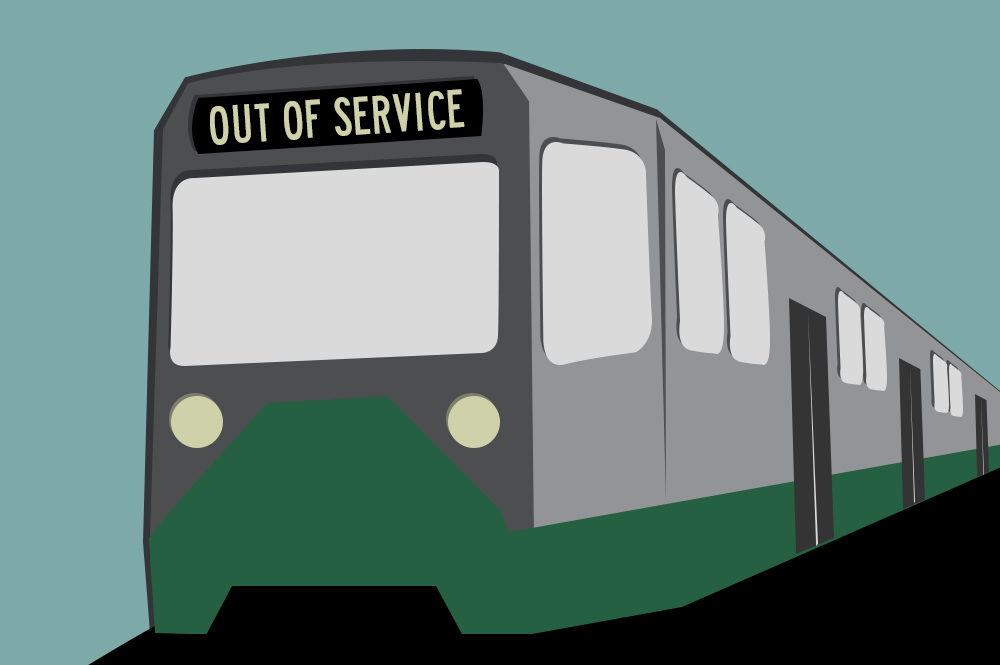
The T’s haves and have-nots
December 30, 2015
Boston Globe | By Joan Vennochi December 17, 2015
 TO FIX ITS aging infrastructure, the MBTA estimates it needs $7 billion. At the same time, the transit agency faces a $242 million deficit in next year’s operating budget.
TO FIX ITS aging infrastructure, the MBTA estimates it needs $7 billion. At the same time, the transit agency faces a $242 million deficit in next year’s operating budget.
With an unbalanced balance sheet like that, every saved penny helps, right?
But when those savings come via service cuts, they hurt, too.
So when is the trade-off worth it? And how much does it take the “public” out of public transit? That’s the equation Governor Charlie Baker must solve.
A proposal to eliminate late-night T service would save an estimated $10-to-$14 million a year. Another proposal to cut back on paratransit services for the elderly and disabled would save $5-to-$10 million. Up against a $7 billion gap, that barely registers as savings.
It does, however, deliver a message about Baker’s public transportation vision. Technically, the T’s Fiscal and Management Control Board oversees the authority and signs off on any budget-cutting proposals. But its decisions are essentially a reflection of Baker’s priorities. By law, he appoints board members and can remove members without cause.
The T’s problems were decades in the making and stretch back over Republican and Democratic administrations. After last winter’s snowstorms brought service to a halt, Baker promised to address longstanding funding and management issues. Now the question is how an administration opposed to taxes and fee increases can find a way to close an enormous budget gap.
“Clearly, the MBTA has a revenue problem,” said Boston Mayor Martin J. Walsh. “I don’t think you can cut your way out of the T’s financial problems,” he added. Revenue enhancement options include dedicated taxes, increased fares, and more advertisements. (Walsh opposes ads for alcohol on T vehicles.)
Concerning proposed cuts, Walsh said he understands the late-night T service “does drain money out of the bottom line.” But eliminating it is false economy, he suggests, because late-night service “is also about promotion and enhancement” of the MBTA.
It’s also about serving a more diverse universe of riders.
Like housing, transportation is becoming an ever-divided world of haves and have-nots. Lawyers and tech entrepreneurs live in pricey condos and call Uber for a ride to the airport or their scenic waterfront office. The office janitor lives far from Boston’s booming downtown, takes public transportation to work, and hopes the bus or train shows up on time and doesn’t break down.
A public transportation system “cannot succeed if it is not egalitarian,” argues James Aloisi, a former state transportation secretary, in CommonWealth Magazine. That means that “you want to ensure that people from all walks of life and all income brackets are sharing and using the system. You want people on the same bus who are wearing shirtsleeves and who are wearing cufflinks. That is the recipe for success, because such a mix means that all citizens have a vested interest in a functioning, well-maintained, reliable public transportation system.”
Any time the T tries to balance its budget by cutting a slice of service out of public transit, it leaves behind another slice of the riding public. And that essentially dooms it.
Yet the MBTA seems ready to end late-night bus and subway service; this month the Fiscal Control Board said staff should start the cancellation process.
Proposed cutbacks to the Ride got a reprieve, after a contingent of senior citizens and people with disabilities appeared before a control board hearing. A regular Ride costs a passenger $3 a trip; “premium” trips, which go to outlying areas, cost $5. Since the overall cost is $45.53 per trip, the service is heavily subsidized. The T is proposing to eliminate “premium” trips, which refers to same-day trip requests or to rides that begin or end at an address greater than three-quarters of a mile from a local bus or subway line.
While the federal Americans with Disabilities Act doesn’t mandate that level of service, the MBTA has provided it for decades. Carolyn Villers, executive director of the Massachusetts Senior Action Council, said members of her group told the fiscal board: “The MBTA has been doing the right thing for all these years. Why would it want to begin doing the wrong thing?”
The answer, of course, is money. And absent more of it, more T riders will be left behind.
Joan Vennochi can be reached at vennochi@globe.com. Follow her on Twitter @Joan_Vennochi.


Recent Comments